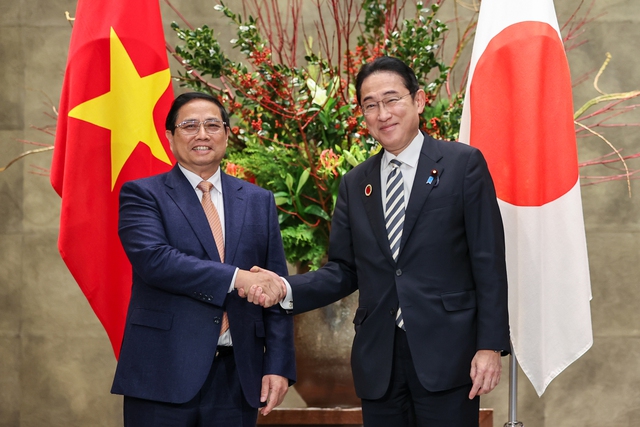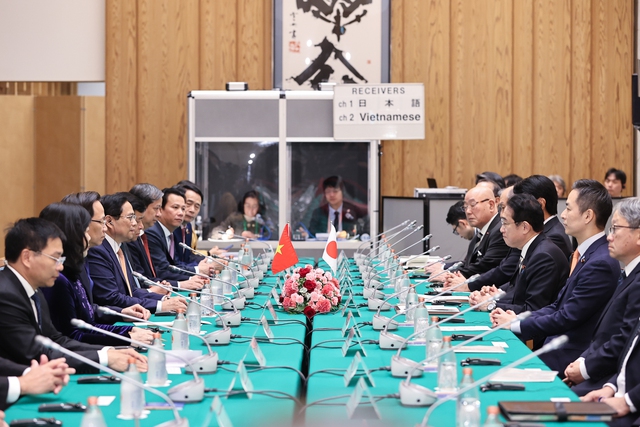Viet Nam seeks Japan's ODA for North-South high-speed railway project
VGP - Prime Minister Pham Minh Chinh held summit meeting with his Japanese counterpart Kishida Fumio in Tokyo, Japan, on December 16.

Prime Minister Pham Minh Chinh (L) holds talks with his Japanese counterpart Kishida Fumio in Tokyo, Japan, December 16, 2023 - Photo: VGP
This is the sixth meeting between the pair over the past two years and the second in 2023.
Pham, who is now in Tokyo to attend the ASEAN-Japan Commemorative Summit, suggested Japan continue new-generation official development assistance (ODA) loans for strategic infrastructure projects, such as the North-South high-speed railway project, metro line projects, supporting industries, new industrial zones, climate change adaptation, digital transformation, green transition, and health care.
He sought Japan's assistance for Vietnamese businesses to join the global supply chains of Japanese enterprises, particularly in the fields of automobile, electronics, health care and apparel; and streamline inspection procedures to open the market for Vietnamese pomelos and Japanese grapes.
The Vietnamese Prime Minister suggested Japan relax entry requirements, and move towards visa exemption for Vietnamese citizens entering Japan.
Prime Minister Kishida, for his part, asserted that Japan will continue assisting Viet Nam in industrialization and modernization, and building an independent, self-reliant economy that deeply integrates into the global community.
The host vowed to strengthen collaboration with Viet Nam in promoting energy transition and reducing emissions via the Asia Zero Emission Community Initiative (AZEC) launched by Japan.

The two leaders pledged to direct ministries and agencies to realize the contents of the Joint Statement on the elevation of the Viet Nam-Japan relations to a Comprehensive strategic partnership for peace and prosperity in Asia and the world, which was adopted by senior leaders of the two countries in late November.
They underlined the need to strengthen political trust, increase high-level exchanges and meetings through the Party, Government and National Assembly channels while enhancing practical and effective defense cooperation via the effective implementation of signed cooperation agreements.
Both leaders spoke highly of the positive progress in numerous key economic projects between the two countries in recent years.
They pledged to foster connectivity of the two economies, ensure economic security, and establish a joint coordinating group between the two governments to step up the progress and efficiency of economic projects underway, including the Nghi Son Refinery and Petrochemical Complex.
The two Prime Ministers agreed to expand cooperation in green transition and climate change adaptation through practical projects and further enhance workforce training collaboration, cultural and people-to-people exchanges, locality-to-locality cooperation, and tourism.
They underscored the importance of stepping up close coordination on regional and international issues of mutual concerns, thus making positive contributions to the maintenance of peace, stability, and development in the region and the world.
On this occasion, the two leaders witnessed the exchange of cooperation documents between the two countries./.
